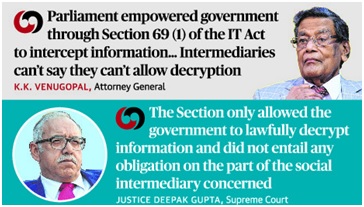
Court to look into govt. plea for access to WhatsApp chats
Why in news?
- The Supreme Court has decided to examine whether social media intermediaries, such as Facebook and WhatsApp, should facilitate the state to access encrypted and private conversations of citizens, purportedly to fight crime and terror.
More in news
- Information Technology Intermediaries Guidelines (Amendment) Rules: SC is waiting for the Centre to notify revised Rules by January 15.
- New rules would cover present day context: These Rules, said the government, were born out of the present day need to usher in a stricter regime and more cooperation to combat the spread of pornography, sedition, hate, fake news, “anti-national activities and terror” online.
- Solicitor General of India said the govt move to gain more access into social media intends a balance between national interest, sovereignty and police investigation with individual privacy.
- Section 69 (1) of the Information Technology Act empowers the govt. to lawfully intercept, monitor and decrypt information through a computer resource if “satisfied that it is necessary or expedient to do so in the interest of the sovereignty or integrity of India, defence of India, security of the state, friendly relations with foreign states or public order or for preventing incitement to the commission of any cognisable offence or for investigation of any offence.
- Justice Gupta remarked that the Section only allowed the government to lawfully decrypt information and did not entail any obligation on the part of the social intermediary concerned.
- Venugopal responded that the government did not want any technical assistance from the intermediary to crack encrypted social media traffic to fight crime. All it wanted was for the online platforms to facilitate access.
- Justice Bose said the hardware may be located outside the country.
- Advocate Rohatgi said the social media intermediaries were under no obligation to disclose details of private accounts. This would breach privacy.
- Justice Bose put matters in perspective, saying the social intermediaries could not claim protection under the fundamental rights of 19(1)(a) and (g) — right to free speech and right to practise any profession. Because they are not indian citizens.

Sources
The Hindu

